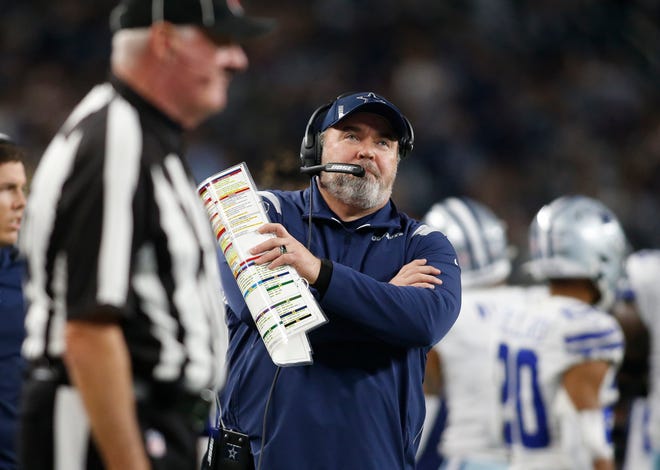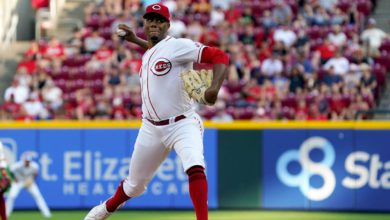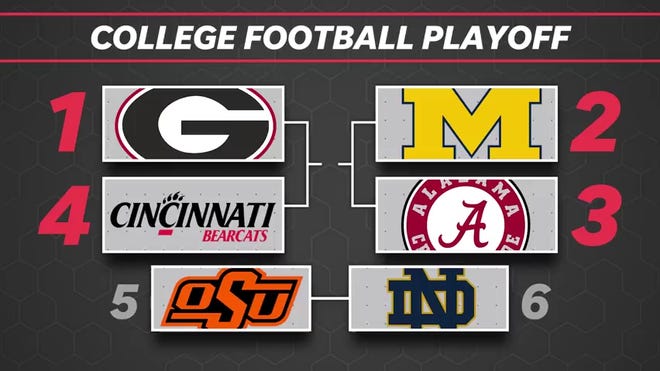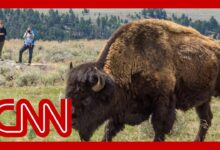
For about 30 minutes on Tuesday, Aaron Rodgers' weekly appearance on "The Pat McAfee Show" was as routine as they can go.
Rodgers, appearing at the Lambeau Field facility due to the short week, gave some highlights from the Packers' last game, including discussing the record-tying touchdown, showing appreciation for winning the NFC North for the third straight year as well as how he "loved" the Ravens' decision to go for the two-point conversion late in the fourth quarter.
Then COVID-19 was brought up, specifically the NFL's response and protocols.
The ball was in Rodgers' hands. Rodgers, wearing a sweatshirt that featured the words "cancel culture" across the middle, could say what he wanted.
And like he previously did on the show in early November when he blasted the NFL over their "draconian" health and safety protocols after he tested positive for COVID-19, Rodgers didn't pass on the opportunity.
"Everything," Rodgers says, is "changing," referencing the protocols.
MORE:'We tend to forget we're dealing with humans'
OPINION:NFL's about-face on COVID-19 testing is a copout

With the league experiencing a COVID-19 outbreak — more than 100 players tested positive last week — the NFL is now testing fully vaccinated players and tiered staff based on "strategic, targeted spot testing" as directed by the NFL's chief medical officer.
Other changes do make it easier for vaccinated players who test positive to return to action if they produce a negative test and are not showing any COVID-19 symptoms, something Rodgers said is one of the "good things" the NFL is doing.
Meanwhile, for those unvaccinated players who are close contacts of someone who tests positive regardless of symptoms, they must quarantine for five days. Unvaccinated players who haven't contracted COVID-19 during the last three months continue to be tested daily.
Because Rodgers tested positive in November, he remains in a 90-day window to avoid testing.
Still, Rodgers steered the interview toward what he feels has been missing during the pandemic.
"The one frustration that I have in all of this throughout this entire time, there hasn’t been a conversation around health, as far as giving people things to think about as far as how to be healthier, as far as your diet, vitamins and exercise," Rodgers said.
Rodgers made headlines this season for misleading the public on his vaccination status, saying he was immunized when he hadn't actually received a COVID-19 shot and then testing positive for COVID-19 following a Halloween party with teammates. He was fined for violating the league's policies. During his controversial interview with McAfee two days after he tested positive, Rodgers said he took ivermectin, zinc, vitamin C and monoclonal antibodies.
"The other thing that hasn't been talked about is treatments," Rodgers said Tuesday. "I've talked to a lot of friends who had COVID, including Joe (Rogan), and figured out a protocol in case I had COVID."
Rogan is a comedian and podcast host who often promotes unproven claims around the virus. Ivermectin has not been approved by the Food and Drug Administration to treat or prevent COVID-19. The FDA has approved it to treat infections caused by some parasites and topically for the skin disorder rosacea and head lice. In animals it is used as a de-worming treatment.
Rodgers, however, said Tuesday that because of taking these treatments his symptoms were "nonexistent" within 36 hours.
"I don’t understand why society and the NFL hasn’t talked about what I think are legitimate treatment options," Rodgers said. "Monoclonal antibodies I believe is one of them."
IVERMECTIN:Five things to know about one of the drugs Aaron Rodgers used for COVID-19
Remdesivir is the only drug to treat COVID-19, according to the FDA, though health care providers are allowed to use products that are not yet approved, or that are approved for other uses, to treat COVID-19 patients. For people at high risk of disease progression, according to the U.S. Centers for Disease Control and Prevention, the FDA has issued emergency use for a number of investigational monoclonal antibodies that can attach to parts of the virus, which can help the immune system and effectively respond to COVID-19.
Rodgers said Tuesday that during the summer nonvaccinated players were being coerced by the NFL into getting the vaccine because the league wasn't going to move games.
Three games were postponed this week due to COVID-19 outbreaks. Two games for Week 15 were to be played Tuesday.
The Packers' opponent Saturday — the Cleveland Browns — had their Week 15 game moved to Monday afternoon due to rising case counts in their organization. Quarterback Baker Mayfield and head coach Kevin Stefanski were among those who missed Monday's game against the Las Vegas Raiders.
"Obviously, it’s been revealed nonvaccinated players are not these dangerous superspreaders," Rodgers said. "Places like '(Saturday Night Live)' and teams that are fully vaccinated can have outbreaks."
Breakthrough cases (those who are vaccinated testing positive) are happening, especially as new variants emerge.
But medical experts still say the vaccine is the best protection in fighting off the virus, from having less severe symptoms and avoiding hospitalization and death. In Wisconsin, those not fully vaccinated died from COVID-19 at a rate 12 times higher than people who were fully vaccinated during November.
The coronavirus, a highly contagious air-borne disease that emerged in late 2019, has killed more than 800,000 Americans and 5.36 million worldwide.
The virus has had multiple mutations with the latest, the omicron variant, now spreading across the world. Omicron has become the dominant strain in the U.S. with medical experts issuing a dire warning for those who aren't vaccinated and urging those who have been vaccinated to get a COVID-19 booster shot.
Source link








